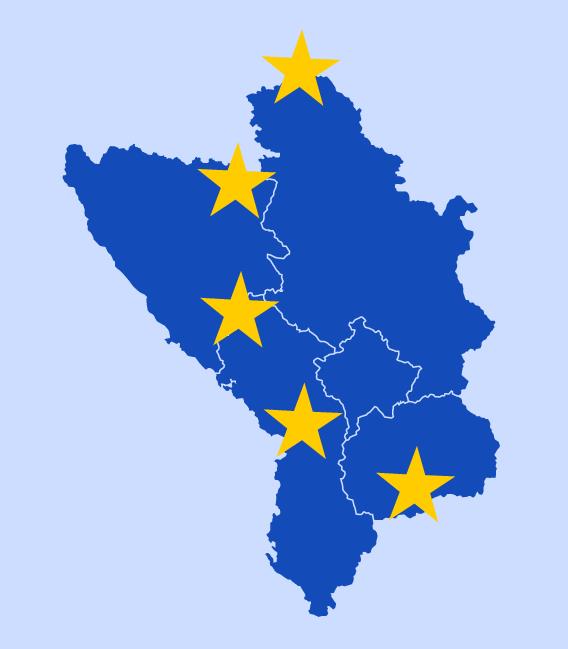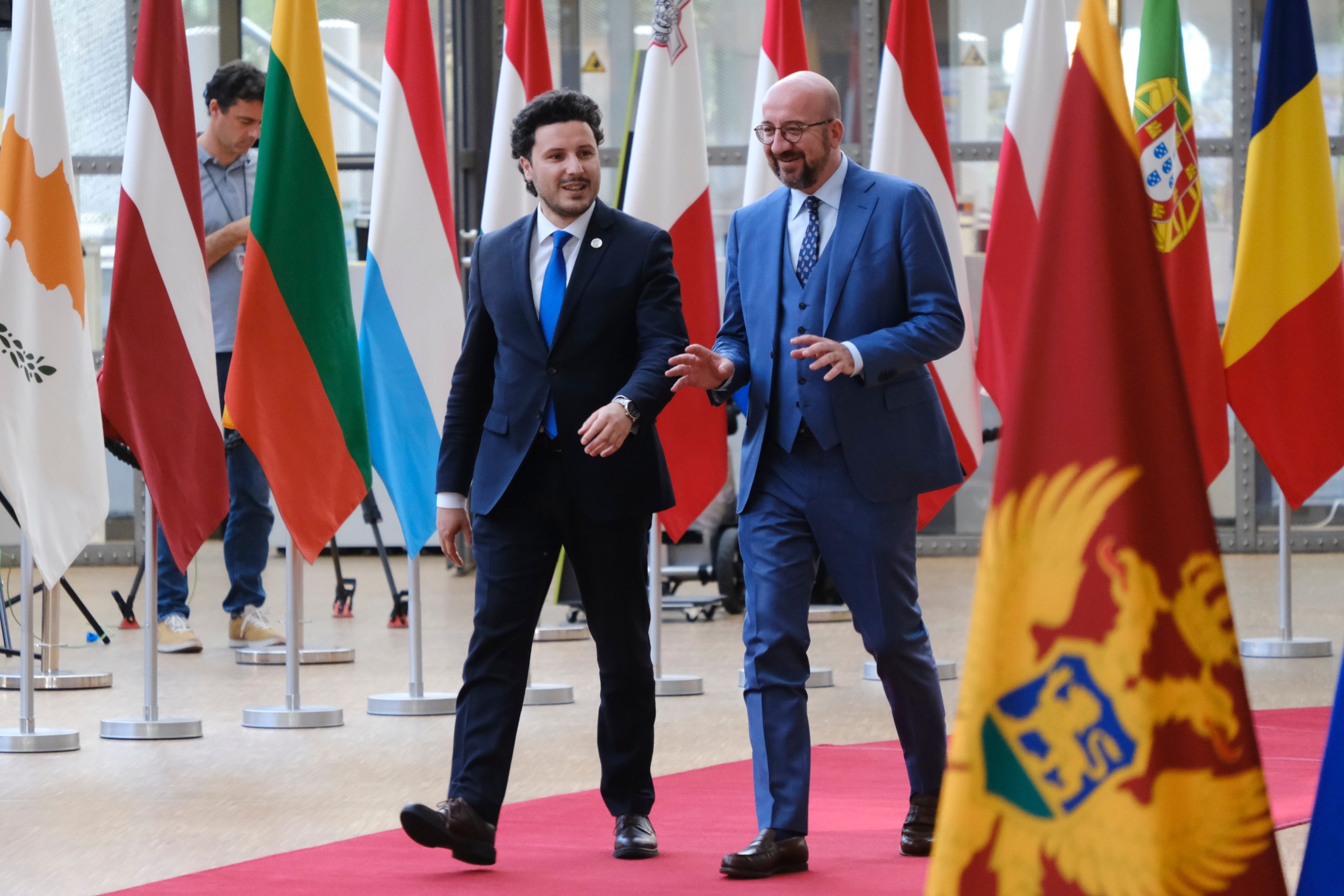EU – Western Balkan summit: Final collapse of the enlargement perspective?
Ivan Iliev and Petra Boskova
The long-awaited summit of the leaders of the Western Balkan countries and the European Union, which took place on June 23, 2022, failed. The issue of Kosovo’s visa liberalization, the accession negotiations of North Macedonia and Albania, and the granting of candidate status to Bosnia and Herzegovina remain unresolved tasks for the European Union. The integration of the Balkans into the EU thus stays an unfulfilled promise.
The prospects of the Western Balkans in the EU have again come under the spotlight during the Russian war against Ukraine, which has prompted Kyiv, Chisinau and Tbilisi to apply for EU membership. Russian aggression in Ukraine is a threat to all countries in the region, and enlargement has now been considered an essential step for ensuring European security. In this case, the summit brought a historic moment for Ukraine and Moldova, which have been granted EU candidate status. Georgia only received the promise of a ‚European perspective‘. Still, the EU accession dynamics remain considerably complicated for the Western Balkans.
The political crisis in Bulgaria makes the enlargement impossible
As one of the EU member states, Bulgaria has been blocking North Macedonia’s accession negotiations to the EU since November 2020, which also prevents Albania’s accession to the Union. The stagnation has left the ambitions of Albania and North Macedonia in limbo, unable to move on for nearly two years.
The relationship crisis between Sofia and Skopje is mainly made up of language issues and the nation’s identity discrepancies. The President of North Macedonia, Stevo Pendarovski, argued at the summit that „it is unacceptable for historical issues and language disputes to be included in the framework of negotiations with the EU“. Prime minister of North Macedonia, Dimitar Kovacevski, expressed his frustration over the process, stating that by the summit outcomes, the EU has lost its credibility for North Macedonia.
Among other things, the Bulgarian Parliament voted on June 22 no confidence in the coalition government of Prime Minister Kiril Petkov, which took power just six months ago. Petkov has pledged to fight corruption and has taken a solid pro-European and pro-NATO position since the Russian invasion of Ukraine, an unusual stance for a country with a traditionally friendly attitude towards Moscow. However, it is predicted that a new government would bring a more favourable policy toward Russia. Concerning EU integration, the political crisis in Bulgaria associated with the government’s fall has tarnished North Macedonia’s and Albania’s hopes of solving possible integration.
On the other hand, North Macedonian frustration is understandable, as the country signed the Association Agreement twenty-one years ago, making North Macedonia one of the longest awaiting candidates in the EU’s history.
Disappointing summit, expected results
Additionally, the European Union representatives expressed only verbal support for the Kosovo visa liberalization process. Kosovo President Vjosa Osmani said that she had received the most substantial support so far from the EU representatives, and she hopes for visa liberalization to be granted soon. On the other hand, President Osmani stated that it is time for Kosovo to move on in the process, as supportive words are not enough anymore.
Also, Bosnia and Herzegovina left the summer disappointed. The country remains hopeful of getting candidate status, but no progress has been made during the summit. The European Union officials state that Bosnia and Herzegovina must fulfill crucial reforms before the receiving candidate’s status.
Like most participating countries, Serbia left the Western Balkans summit disappointed. Serbian president Aleksandar Vučić claimed that nothing significant happened at the meeting. Vučić added that Serbia supports North Macedonia’s and Albania’s ambitions to become EU members but criticized the EU for the stagnation of the process.
Even though the summit disappointed many, the outcome is not surprising. Considering the unstable political situation in Bulgaria, it was not expected that the summit would change the Bulgarian position regarding the blockade of North Macedonia (and Albania). Therefore, despite some clues and signs that the veto could be lifted soon, the summit was not a place where a crucial decision was expected to be made. However, it does not mean North Macedonia should not be concerned and frustrated. The blocking has been ongoing for too long, and the EU is losing momentum in North Macedonia and Albania. In the current geopolitical situation, the EU cannot afford to lose two crucial countries in Western Balkans.
Regarding Kosovo, the frustration is understandable. Kosovo has fulfilled all the criteria already in 2018, but the ball is now on the EU’s side. Since Kosovo is developing robust cooperation with Western partners, the EU should grant visa liberalization, as all the countries that met the requirements have been given this right before. The European Union must realize that the EU’s reputation is at stake in Kosovo. If the EU continues to reject visa liberalization for Kosovo, it could hurt and decrease the country’s efforts to meet the EU’s standards.
Concerning Bosnia and Herzegovina, the situation is even worse. The disunity of the European Union members concerning granting BiH candidate status creates a severe issue for Bosnia and Herzegovina and the EU’s ambitions. Even though Bosnia and Herzegovina started to seek EU membership sooner than Ukraine and Moldova, the latter-mentioned countries have been granted candidate status already, while BIH has not achieved this status yet. In the current situation, the BIH leadership must admit that EU membership is somewhat unrealistic. Therefore, they must be honest with citizens and try to find other partnership streams, as the EU will not even get closer to BIH in the upcoming years. That fact is frustrating for BIH, but the EU should also be concerned. Losing the faith of BIH citizens could bolster Russian, Chinese and Turkish influence and bring further political and ethnic instability to BIH.
Conclusion
It is crucial to realize that the results of the latest Western Balkans summit are not the consequence of the venue. The meeting was a formal event where no critical political decision was expected to be delivered this time. Therefore, Western Balkans must continue to seek the European Union. Even though it is challenging, the EU is still the strategic option for the WB6. However, to achieve membership, the WB6 countries must realize that all the required reforms are not only to be done for the EU but primarily for the sake of their respective citizens and/or economies. Without this attitude, neither EU membership nor developed and democratic Western Balkans would become a reality.
Ivan Iliev is a Research Fellow for the Western Balkans at the Strategic Analysis Think Tank
Petra Bošková is a Project Coordinator and Junior Researcher at the Strategic Analysis Think Tank



Contact us